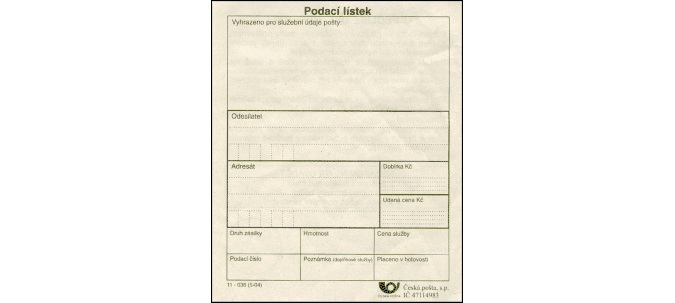NOTE: due to current COVID-19 regulations, entry to Czech post offices is possible only while wearing a face mask. More information can be found here.
Czech post offices don’t just provide basic postal services. Here you can pay bills, refresh your mobile phone credit, complete a wire transfer, and more. Since 2016, Czech Post has been implementing payment terminals to allow visitors to pay by credit card at locations; most (but not all) locations are now covered.
PARTNER ARTICLE
Generally, post offices are open between 08:00 and 18:00 on work days, although smaller POs observe a lunch break from 12:00 to 13:00. Most are usually open on Saturday mornings; some are open only from 08:00 to 10:00. On Sundays and public holidays, the majority are closed.
The main post office in Prague 1 (Jindřišská 1) is open 24 hours a day, 7 days a week. Different windows handle different services.
In large offices, such as the main post office in Prague, you’ll find a wide range of counters, and in such places, a numbered ticketing system is in operation, with tickets issued according to the service you select. Smaller post offices have only 3 or 4 counters and therefore most services are handled at any of them.
Bear in mind that many postal staff only speak Czech, especially beyond the capital, although the likelihood of dealing with an English speaker is greater at the main PO in Prague. And as signs and information about services are in Czech only, it might be a good idea to ask a Czech-speaker to accompany you if you’re worried about language issues.
Sending a letter or package
To post a letter queue at the window marked listovní služby, for parcels it’s příjem a výdej balíků, and to make payments go to the peněžní služby window. In larger branches select your service from a ticket machine and take a number. Press listovní zásilky for letters and balíkové zásilky for parcels.
Postage for a standard letter (14 cm x 9 cm and weighing up to 50 g) within the Czech Republic is 10 CZK. Registered mail, or doporučená zásilka, for the same size letter sent somewhere within the country costs 30 CZK and is insured for loss or damage up to the value of 500 CZK.
When sending registered mail, you’ll need to fill in a submission form (podací lístek) so that the staff can proceed with your order.

The key boxes to fill in are sender (odesílatel) and addressee (adresát), although there is not much room for either, especially when filling in a lengthy international address.
When sending a letter abroad, chose obyčejně or letecky; surface or air mail, respectively. A letter sent anywhere in Europe via air mail will take 3–5 days; outside Europe it can be 5–9 days.
Sending parcels within the Czech Republic costs 43–92 CZK, depending on the weight. Sending a parcel abroad is charged by different weight classes than domestic parcel postage. There is also a maximum weight of 30 kg. The final factor in determining price is whether it is surface or air.
A package to a European country can take up to six days by air mail. By the same means to non-European countries, the time varies from one to two weeks. If you are collecting registered mail or a package, take the slip that appears in your mailbox and your passport or residence card. If the word clo is ticked on your slip you’ll be expected pay customs duty.
Picking up mail
When registered mail arrives, the postal worker will ring your bell and ask you to sign for the mail. If you’re out, they will leave a Oznámení o uložení zásilky specifying (often in rather difficult to read handwriting) when and where you can pick up the letter or parcel. Check the pick up time, as you may have to wait a few hours before the letter is available.
Mail not picked up within the 15-day deadline will be returned to the post office, and you’ll then be sent another slip in the form of a computer printout, informing you that the mail is at the post office. Remember to take some form of recognized identification (such as a passport or residence permit) as you will be asked to sign for the mail.
Paying bills by Czech Post
You can also pay energy bills, water, phone, and tax at the post office. If a company is billing you, they will send you a pink postal order (poštovní poukázka). If you are sent a postal order, most of the information in the below form will be filled out, but if you are drafting a new one, you’ll need to enter the information yourself.

A. Boxes with částka and kč/h: the amount
B. V prospěch účtu: payee account number and bank code
C. Kód banky: Bank code identification number (ie. 0800 is Česká spořitelna)
D. Konstantní symbol: Identification (not always needed)
E. Variabilní: symbol: Variable symbol. Identification code – usually the number of an invoice
F. Specifický symbol: Specific symbol. A code relating to the type of payment (leave blank if not provided)
G. Adresa majitele účtu: The address of the payee
H. Účel platby: Literally purpose of account. You can just write ‘telephone bill´, ‘rent´ etc
I. Slovy: write out the amount in words
J. Č. Účtu/ Kód banky: bank account: payee bank account number.
Every time you pay by a postal order you are charged. For amounts up to 5,000 CZK the fee is 22 CZK. For amounts 5,000–50,000 CZK the fee is 33 CZK. For every 10,000 CZK above 50,000 CZK, an additional 6 CZK is charged.
If you are receiving money, for example when the tax office owes you money and you opt to have it sent to you, you’ll receive a poštovní pouzkazka B. All the details will be filled in, and all you need to do is take ID and present the poukazka with ID at the PO.
For more detailed information on all of the above services refer to the English version of the Czech Post website.












 Reading time: 5 minutes
Reading time: 5 minutes 


























